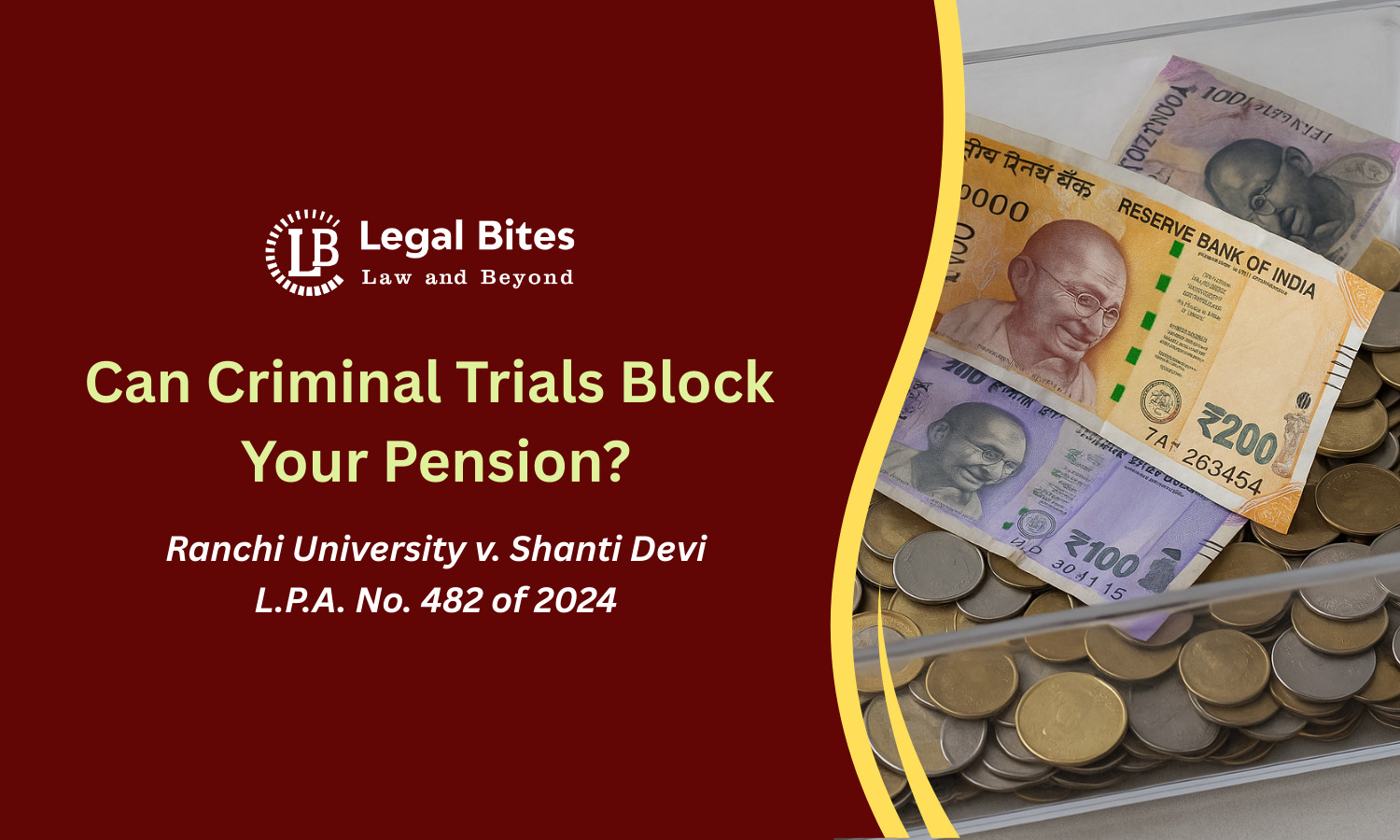
Retirement benefits such as pension, gratuity, provident fund, and leave encashment are not mere concessions or acts of generosity by the State or employer. They are recognised as vested rights accruing to an employee after years of service. A recurring legal controversy, however, is whether these benefits can be withheld if a criminal case or departmental proceeding is pending against a retired employee.
Jharkhand High Court, in Ranchi University v. Shanti Devi (L.P.A. No. 482 of 2024, decided on 25.08.2025), revisited this critical question. The Court reaffirmed that the pendency of a criminal proceeding, in the absence of conviction, cannot by itself be a ground to deny retirement benefits to an employee.
Factual Background
Service History:
- Shanti Devi was appointed as a lecturer in 1984 and later absorbed into the Ranchi University service.
- She also served as a member of the Jharkhand Public Service Commission (JPSC).
Criminal Proceedings:
- In 2011, she was arrested in vigilance cases, leading to suspension.
- Out of six cases, she was acquitted in three, while three remained pending.
Service Developments:
- Despite suspensions, she continued her duties after bail and was later compulsorily retired in 2019.
- While her Provident Fund was released, her pension, gratuity, and leave encashment were withheld citing pending criminal cases.
Litigation:
- Shanti Devi approached the writ court, which directed the University to release retiral benefits considering 6th and 7th Pay Commission revisions.
- The University appealed, arguing that criminal cases involving moral turpitude barred her entitlement.
Issue
- Whether the pendency of criminal cases, without conviction, bars payment of pension, gratuity, and other retirement benefits?
Judicial Reasoning
1. Pension as a Vested Right
The Court relied on the landmark Supreme Court decision in Deoki Nandan Prasad v. Union of India (1971) 2 SCC 330, which established that:
- Pension is not a bounty but a valuable statutory right.
- It is a form of deferred salary and has a nexus with the salary last drawn.
Thus, unless there is a legal bar (such as dismissal, removal, or conviction for grave misconduct), pension cannot be withheld merely at the employer’s discretion.
2. Full Bench Precedent in Dr. Dudh Nath Pandey (2007)
The Jharkhand High Court’s Full Bench had earlier clarified that:
- Under Rule 43 of the Bihar Pension Rules, the Government has no power to withhold gratuity or pension during pendency of departmental or criminal proceedings.
- Leave encashment is also protected and cannot be withheld unless dismissal is ordered.
3. Larger Bench Clarification (2025)
- A five-judge Bench of the High Court (18.03.2025) further settled doubts on leave encashment:
- Leave encashment = Salary (cash in lieu of unavailed earned leave is part of salary).
- Dismissal bars leave encashment, but mere pendency of proceedings does not.
- Even after the conclusion of proceedings without conviction, benefits must be released.
4. Application to Present Case
- Shanti Devi was never convicted in any criminal case.
- No departmental penalty was imposed on her.
- Her compulsory retirement was not equivalent to dismissal or removal.
Therefore, the University had no legal ground to withhold her pension, gratuity, and leave encashment.
Decision of the Court
The Division Bench upheld the writ court’s order, directing Ranchi University to:
- Fix Shanti Devi’s pension, considering the 6th and 7th Pay Commissions.
- Release gratuity, leave encashment, and all other retirement benefits due.
- The appeal was dismissed, with the Court emphasising that pending criminal cases cannot justify deprivation of retiral rights in the absence of conviction.
Key Highlights of the Decision
Tarlok Singh Chauhan (CJ) and Rajesh Shankar (J) stated:
In view of the settled legal position, the learned writ Court committed no error in directing the appellant to fix the pension of respondent No. 1 by taking into consideration 6th and 7th pay revision and thereafter fixing the benefits and pay the amount of gratuity, leave encashment and other benefits for which respondent No. 1 was entitled in accordance with law in view of the fact that respondent No. 1 had neither been convicted nor was any punishment imposed upon respondent No.1 pursuant to any departmental enquiry.
Key Legal Principles Reaffirmed
- Pension is a right, not a bounty – It is protected as property under Article 300A of the Constitution.
- Pending proceedings ≠ Conviction – Only proven guilt can justify withholding benefits.
- Leave encashment is part of salary – It cannot be withheld unless dismissal or removal occurs.
- Employers cannot act arbitrarily – Universities, departments, or government bodies must strictly follow pension rules and judicial precedents.
Implications of the Judgment
- For Employees: Protection against arbitrary withholding of retirement dues merely due to pending litigation.
- For Employers: Clear judicial reminder that administrative discretion cannot override statutory rights.
- For Jurisprudence: Consolidates earlier rulings by harmonising Supreme Court and High Court precedents.
Conclusion
Jharkhand High Court’s decision in Ranchi University v. Shanti Devi sends a strong message: Retirement benefits cannot be suspended merely because criminal cases are pending. Conviction, not pendency, is the decisive factor.
This judgment not only safeguards the dignity and financial security of retired employees but also strengthens the principle that pension and gratuity are earned rights flowing from long years of service.
Important Link
Law Library: Notes and Study Material for LLB, LLM, Judiciary, and Entrance Exams